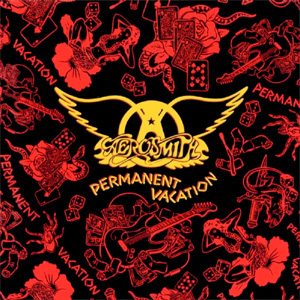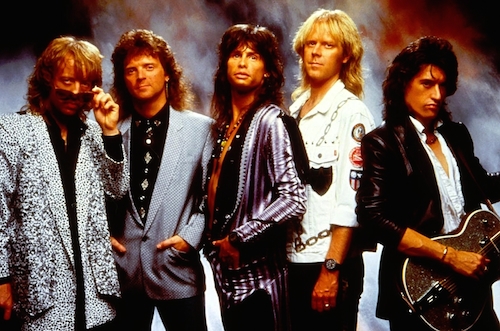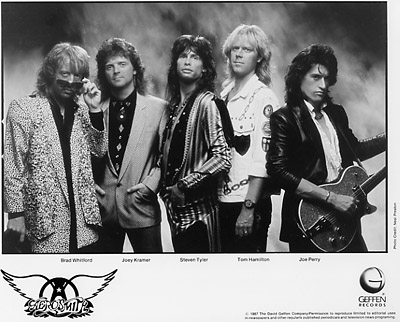
There’s a conventional wisdom that 1987’s Permanent Vacation marked Aerosmith’s second bite at the comeback apple, but it really had little in common with the album that preceded it. When the band released Done with Mirrors in 1985, it marked a reunion of its original lineup, with a presumed commercial interest in what it had to offer. Permanent Vacation, on the other hand, pointed to a different kind of comeback: a return from the fringes of irrelevance.
To really understand Permanent Vacation, consider Done with Mirrors in the context of its contemporaries. Mirrors is straightforward to a fault, taking little advantage of its performers’ strengths—from the opener, “Let the Music Do the Talking,” it sports substantial inertia, and nearly zero personality. Producer Ted Templeman has long claimed that recording in unfamiliar environs (Berkeley, in an attempt to keep the band drug-free, which worked about as well as one might expect) meant he couldn’t get as much out of Joe Perry’s guitars and Joey Kramer’s drums as he might have in a studio with which he was comfortable. But the way that charisma factory Steven Tyler sings “Shela,” with an utter lack of bombast and sounding averse to the microphone in the urgency-free “Shame on You,” is ultimately a problem of design, not equipment.
The set’s core problems were compounded by its inability to measure up in the environment in which it was offered. By 1985, rock had moved far from the paradigm in place eight years earlier for the fully intact band’s last album (1979’s Night in the Ruts was mostly missing Perry and 1982’s Rock in a Hard Place lacked him and rhythm guitarist Brad Whitford); the new glam-metal, had made a major breakthrough in 1983, and the likes of Motley Crüe, Quiet Riot and Def Leppard were deluging the charts with high-sheen hard rock. By comparison Mirrors sounded flat, and heavily dated. The band that had 10 years earlier released a record that contained both “Walk This Way” and “Sweet Emotion” clearly had a capacity for dynamic material (and in fact was an obvious inspiration for several newer acts), but scarcely made that case with a drab dust collector of a record.

No funhouse, Mirrors landed with a deserved thud, and served as confirmation that a contemporary audience was not interested in new Aerosmith music according to the musical terms under which it had previously operated. If the group wanted to compete for listeners, it needed to change its playing field.
Before the band even got to its next album, the potential opportunity of new horizons was made clear. In the summer of 1986, Run-DMC released a cover of Aerosmith’s “Walk This Way,” featuring Tyler and Perry on the single and its accompanying video. Fun, fresh and inventive, it was an enormous hit, and a seminal moment in the migration of hip-hop into mass culture. It was one hell of a hot iron, and surely helped guide Aerosmith’s next strike.
It set the stage for Permanent Vacation, whose real story was its confluence of artistic expression and business savvy, as pure a demonstration of adaptability to market trends as the industry has ever seen. Mind you, this never was a band particularly stubborn about its sound, which had evolved on a smaller scale with every record since its self-titled 1973 debut. Eight previous albums had seen half a dozen different producer credits (though Jack Douglas was part of most); this wasn’t a band rutted in a single way of doing business.
Even so, Permanent Vacation, released on August 31, 1987, was a lightning bolt of a record. It hauled Aerosmith into a modern milieu, but rather than losing the band’s essential character, the set enhanced it. Perry’s riffs sounded sharper than ever in producer Bruce Fairbairn’s meticulous assemblies, which cribbed more than a little from what “Mutt” Lange was doing at the time with Def Leppard (a derivation shamelessly audible in the response chorus of “Love in an Elevator” on Aerosmith’s 1989 follow-up, Pump). Tyler’s grit-trimmed wail bounced around like a ping-pong ball in a lottery machine, freed from the sometimes-sludgy mixes with which the band had made its name, and became a sharp-edged brand. In overhauling its sonic design, the band reset expectations, and laid out a sonic blueprint it has followed ever since.
Permanent Vacation wastes no time in establishing a modus operandi that prioritizes texture and gloss; an opening conceit of rock ’n’ roll whale song gives way to a wall of guitar bombast, stoking an enormous atmosphere of thunderous drums and echoing howls until Tyler’s chipper, yodeled war cry lights the fuse on the leadoff track, “Heart’s Done Time.” Everything a listener needs to know is right there: crisp production that mixes technique and trickery, melded to the bravado the band always brought to the table—and it’s a winner.
“Magic Touch” cements the new paradigm, forging an alloy of big, boisterous drums and a bottomless well of sound, with Tyler barking gamely to prod its roomy hook. The track is expansive, bounding and above all contemporary, with plenty of guitar sizzle and glam touches; a dressed-up, crunching workout of Aerosmith’s updated musical identity. Certainly drummer Joey Kramer has never sounded so arena-ready.
The detailed soundscapes are clever and enticing, most of all when they provide Tyler an immense playground in which to strut. Right at home amid excess, he’s the spark plug of the richly appealing “Dude (Looks Like a Lady),” playing the mercurial ass-kicker through a speaker-leaping introduction, and then chewing up lyrical scenery with such bravado that it is like opening a hydrant of swagger and style. Tyler pleads in a yelp that someone, “do me,” and Perry happily complies, throwing down polished guitar swatches to adorn this lyrical descendant of the “sweet talkin mama with a face like a gent” from the band’s classic “Sweet Emotion.”
Watch the video for “Dude (Looks Like a Lady),” the smash hit from Permanent Vacation
There’s more studio dressing in place than is good for the full-bodied blues rock of “Hangman Jury,” but the album most often hits its marks in modernizing the group’s sound. The Beatles import “I’m Down” is a loaded rejuvenation of the old-school Fab Four mono model, as Perry’s guitar chug leaps in from the left, Whitford applies throb from the right and Tyler howls his way right down Main Street to reinvent the tune with a bit of dirt under its fingernails.
Related: Listings for 100s of classic rock tours

Bringing in songwriters outside the band for the first time sharpens overall focus (as does the fact that, as Tyler would later note, it’s the first album the band ever recorded sober), though some tunes sound too workshopped as a result, including the gusty Jim Vallance collaboration “Simoriah,” in which Tyler’s echo-laced vocal floats above a plump, propulsive backdrop, but could do with a little more rasp and charisma. Somewhat counter-intuitively, among the rangiest displays are those authored solely by band members, including Tyler’s slinky blues crawl “St. John,” and the Tyler/Whitford title track, a rumbling steam-blower decorated with steel-drum touches. Tyler and Perry are co-authors, and the co-drivers, of “Girl Keeps Coming Apart,” with the singer snapping sideways at the mic as Perry ignites an arrangement that radiates energy and flair.
The one song that registers as pure accommodation of commercial considerations is the power ballad “Angel,” a very-much-of-its-time lighter-waver that receives little but saggy earnestness from Tyler as he keeps time with its synthesizer-drenched overload. Much like the similarly gassy “I Don’t Want to Miss a Thing” in 1998, it gave the band a much-needed hit, but it’s a song that could have been recorded with equivalent artistic results by anyone.
A cynical examination of Permanent Vacation reveals traces of selling out and watering down core values to sell records, but the set ultimately represents real progress. Proof rests in the popular “Rag Doll,” a spectacular addition to the band’s catalog, with flavor bursting from its many crafty flourishes. Combine Tyler’s juicy cadence and the perfectly framed bass drum anchoring the B-minor spring behind him, layer in sweet slide guitar twang and horn pops along the way, and the result is a declaration that Aerosmith can play the pop rock game as well as anyone. Topped off with a slightly loopy lyric, and a jolt of personality other bands can’t match, it’s a signature work, right down to Tyler’s fadeaway scat at its close. Cashing in or no, this was a band that found something worthwhile in these sessions.
The album-closing instrumental “The Movie” illustrates where Fairbairn and the band journeyed philosophically to make Permanent Vacation, balancing performance and sonic effects. In many ways the most substantial demonstration of the new world into which the band had entered, it could not have existed on any previous Aerosmith album with its combination of grand presentation, texture and atmosphere. It is for all intents a manifesto detailing places to which the band’s range extended in the album’s creation, and would serve as a road map toward a long and successful future of exploring that new paradigm.
Aerosmith will return to the road in 2023 and 2024. Tickets are available here and here.


2 Comments
Aerosmith was a great band until power ballad after power ballad just wore thin with this listener. One or two ballads=ok but more than that= blah. Not Good! Cryin, Angel, I don’t want to miss a thing are too much and too many. But they sell records. Saw interview with Foreigner, and Lou Gramm and Mick Jones commented on this same thing. Avoid betting a bubble gum sappy wedding song band—my words not Foreigners but essentially what the meant.
Done With Mirrors is a Great album. A rocker! I really love this album. Shelia is one of the best songs on it. It rocks all the way through. It is my favorite Aerosmith album. Permant Vacation is a really good album as well. Aerosmith pumped out some gems throughout the 80s. After that, they went down hill fast. They were trying to be too mainstream.